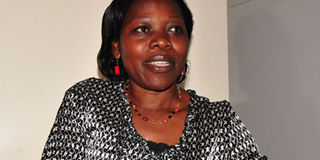From patient to champion: How a cancer diagnosis shaped her life

Gertrude Nakkigude speaks during the interview. Photo by Michael Kakumirizi
Even at first encounter, Gertrude Nakkigude’s wide smile is enough to make you feel at ease. At the Uganda Women’s Cancer Support Organisation (UWOCASO) offices in Ntinda, where Nakkigude volunteers as the group’s spokesperson, the first thing you notice as you enter the premise are the various posters on cancer.
The more than 50-member strong group is run by survivors themselves. Like many who have learnt to embrace the challenges that come with being diagnosed with a disease like cancer, Nakigudde’s journey has not been a fairy tale, but it is one that she has been able to walk never the less, over the years. It started in 2001. She was 30.
A lump had started growing in one of her breasts, but she ignored it hoping that since it was painless, it would soon disappear.
“I just did not know what to do, so I kept it to myself. After several months, I told a few friends and family, but because it was painless we all ignored it,” she recalls.
Then one morning in February 2002, she felt a sharp-piercing pain that lasted for several minutes.
“I decided to go and see a doctor who immediately recommended a biopsy,” says Nakigudde.
A biopsy is a common procedure used in testing cancer. Nakigudde’s biopsy test results were positive for breast cancer.
“When the doctor broke the news, I felt as if I was being laid in a coffin. I cried, wailed until I fainted. It took me a week and a lot of counselling to regain my senses,” says the mother of one.
On her next visit to the hospital, the British doctor who treated Nakigudde informed her that she would undergo chemotherapy, radiotherapy and mastectomy.
“I needed a dictionary to understand these words since everything was new. I used google but the more I tried to read about the disease and its treatment, the more confusing and complex it became,” she says.
Despite all that she was going through, her family remained supportive. Several suggestions were made for her to be taken to Nairobi or South Africa for further treatment, but because there was no money, she decided to go to the Uganda Cancer Institute at Mulago.
Cutting off her breast
Here, she underwent a mastectomy – a surgical procedure where her affected breast was cut off. The surgery cost Shs1.3m. After recovering, Nakigudde then started chemotherapy treatment.
“The cancer institute at the time had only one doctor and a nurse who attended to both inpatients and outpatients. I was always on the out-patient side but even if I needed to be admitted, the two wards were small and always full,” Nakigudde recounts.
Starting chemotherapy
Ideally, chemotherapy should be administered through drip for between 20 and 30 minutes, but because of limited space at the facility, Nakigudde would just inject the medicine. She recounts how one day, she collapsed in a taxi on the first day she received chemotherapy because the drug was so strong.
“I had gone alone. No one told me that the drugs were so strong and that I needed to rest after the injection. So once I received treatment, I got into a taxi to take me home,” she says. Dr Jackson Orem, the current director of the institute was a working student at the same facility at the time and explained to Nakigudde the complexities of chemotherapy medication.
After undergoing chemotherapy for five months, Nakigudde was supposed to start radiation therapy to be able to kill the cancer cells.
“But every time I went for treatment, the machine would be broken so after three months of visiting the facility without help, I decided not to go back,” says Nakigudde adding that she informed her doctor who then decided to put her on another five year treatment plan known as hormonal therapy.
Hormonal therapy can reduce the risk of the cancer from recurring or spreading, according to Dr Noleb Mugisha, a physician at the cancer institute.
Turning point
Nakigudde’s turning point came when one day, after waiting for several hours in the queue for treatment, one of the medicines that would be administered to her turned out to be expired.
As a result, she missed her dose for the day because at the time, the drug could only be bought from the Joint Medical stores.
“I complained and even went to the doctor and told him about the situation. This earned me a name – complaining patient,” she says.
It was from this point that she decided to speak publicly about the rights of cancer patients, but also about the disease itself.
Together with other women cancer survivors, they started the support group which is now a fully-fledged organisation with an office. It is at this office that Nakigudde and other cancer survivors meet, counsel and reach out to people suffering from the disease.
The challenge ahead
But despite these millstones, Nakigudde is aware of the challenges that lie ahead.
“Cancer is still associated with a lot of stigma. we want to raise more awareness about this so that people know that it is a disease that can be managed if people are diagnosed early enough,” says Nakigudde.




